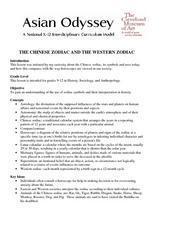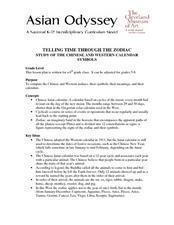Curated OER
Aerology- The Study of Mars
Students investigate various aspects of the planet Mars. They examine a core sample that is simulated to make observations. Then compare the known sample with one that is unknown and differentiate between the two. Students hypothesize...
Curated OER
Gravity
Sixth graders explore the characteristics of gravity. They discuss gravity on Earth and then use cereal boxes to research and compare the weight of objects on Earth to the weight of those objects on other planets.
Curated OER
Temperature Variations and Habitability
Students, in groups, evaluate conditions outside the building and inside the classroom using thermometers, barometers, anemometers, etc. They compare interior and exterior conditions. They consider and discuss factors that contribute...
Curated OER
Observing Mars in the Night Sky
Students compare and contrast the orbits of Earth and Mars, locate the planet Mars, and diagram its retrograde motion.
Curated OER
Destination Mars!
Fifth graders view Mysteries of Earth & Mars Video on DVD and record thoughts in their online journal. They record data in a spreadsheet about each planet then form a theory of the best time to launch a space craft from Earth to land...
Curated OER
Today's Weather on Mars
Students investigate the temperature and wind data locally, nationally, and internationally and compare these conditions to those on Mars. Conclusions are drawn about the differences of these conditions and the causes for the variance...
Curated OER
Our Home in the Milky Way
Learners gain appreciation of the vastness of our galaxy by viewing an applet about the Milky Way. Students hypothesize about how long it would take to get from Earth to Pluto.
Curated OER
As the World Turns
Third graders read books and participate in class discussions about the motion of the stars and planets and moons in relation to the Earth. In small groups, 3rd graders act out these movements to music.
Curated OER
The Chinese Zodiac And The Western Zodiac
Students create individual horoscopes that contrast and compare Western and
Chinese views of their futures using poster boards and magic markers. In-class discussion is used to evaluate the use of the Zodiac in different cultures.
Curated OER
Scientific Theories
Ninth graders compare and contrast how different models can be used to represent scientific understandings. They evaluate the use of data when considering scientific claims. Students debate a variety of socio-scientific issues and the...
Curated OER
Wildlife Conservation (Senior, Science)
Twelfth graders explore wildlife and the diversity that makes up the living part of the planet Earth. The exploration part of the assignment is done on the Internet using selected web sites.
Curated OER
Global Change — Change and Cycles Where Land, Air and Water Meet
Pupils participate in an experiment to define a parts-per-billion solution. In this ecology lesson, students select a second substance to create a parts-per-billion solution and observe and record their results. Pupils work in groups to...
Curated OER
Aquatic Organisms
Pupils create a poster describing the five characteristics of a salt water organism compared to a fresh water organism.
Curated OER
Will It Rain Today or Tomorrow?
Students examine how to forecast weather. They examine the different types of weather and learn the correct vocabulary.
Curated OER
Telling Time Through the Zodiac
Students compare the Chinese and Western zodiacs, their symbols, their meanings, and their calendars through a in-class discussion and a small group project. This lesson includes vocabulary and extensions.
Curated OER
Everybody Needs a Rock
Second graders examine science non-fiction books in the 500 section of the media center. They listen to Byrd Baylor's, Everybody Needs a Rock, and write a sentence that tells why everyone does need a rock. They illustrate the sentence.
Captain Planet Foundation
Worm Your Way Out of This
How can you provide healthy soil for your garden? Study worms, bacteria, and other microorganisms in a lesson about decomposition and organic compost. After discussing what you know about worms and watching a video, watch what worms do...
Curated OER
Sky Watching
Middle schoolers explain how our knowledge of the sky has been enhanced by telescopes. They make their own night-sky observations, diagram and describe what they see, and examine pictures taken by telescopes.
Curated OER
Scientific Notation myTestBook.com
In this scientific notation worksheet, students solve equations containing numbers in standard notation and scientific notation. They add, subtract, multiply, and divide problems with scientific notation. This one-page...
Curated OER
The Deep
In this deep ocean worksheet, students answer twenty questions after watching a video about the species that live in the deep ocean. Topics include jelly fish, hatchet fish, anglers, tubeworms, sea urchins, and plants that grow in deep...
Curated OER
Black Holes...III
In this black holes worksheet, students use a formula for time dilation which causes delays in events that occur near the black hole. They solve 6 problems using the equation.
Curated OER
Water Works Wonders
Students examine where water is found in the world, how we use it, and the various forms it takes. They observe the refraction of light through a prism, record the day and night sky over a week's time, and create a topographic model of...
Curated OER
The Mathematical Dynamics of Celestial Navigation and Astronavigation
High schoolers explore the different methods used in celestial Navigation and astronavigation. In this math lesson, students construct a sextant and demonstrate how it works.
Curated OER
Early Space Missions
In this space missions worksheet, students read about the launch of the space shuttle Magellan and its exploration of Venus. Students complete 2 short answer questions based on the reading.























